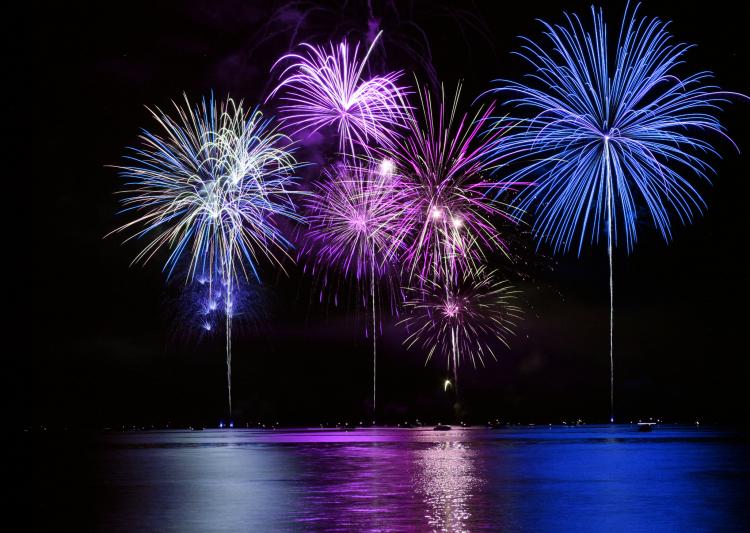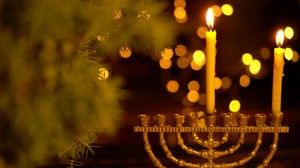
Do You Get a Black Moon?
What is a Black Moon, and why does it happen in December?
New Year’s Day according to the Gregorian calendar (January 1) is one of the most popular occasions in India. Many people throughout India celebrate this festive occasion with loved ones or in large gatherings.
New Year's Day is an optional holiday. Employment and holiday laws in India allow employees to choose a limited number of holidays from a list of optional holidays. Some employees may choose to take the day off on this day, however, most offices and businesses remain open.

New Year's Day on January 1 in the Gregorian calendar is celebrated in many countries including India.
©iStockphoto.com/scampdesigns
People in all parts of India dress colorfully and indulge in fun filled activities such as singing, playing games, dancing, and attending parties. Night clubs, movie theatres, resorts, restaurants and amusement parks are filled with people of all ages.
People greet and wish each other Happy New Year. Exchanging messages, greeting cards and gifts are part and parcel of the New Year celebration. The media covers many New Year events which are showcased on prime channels for most of the day. People who decide to stay indoors resort to these New Year shows for entertainment and fun. The age-old tradition of planning new resolutions for the coming year is a common sight. A few of the most popular resolutions include losing weight, developing good habits, and working hard.
Larger cities such as Mumbai, Delhi, Bangalore and Chennai organize live concerts which are attended by Bollywood stars and other well-known personalities. Large crowds gather to attend such shows, while some individuals prefer to celebrate with their close friends and family members. The fun filled occasion is considered a great opportunity to get closer to the loved ones in your life and to revive contact with lost friends. The idea is to wave goodbye to the year gone-by and welcome the New Year in the hope that it will invite truckloads of happiness and joy in everyone’s life.
New Year’s Day on January 1 in the Gregorian calendar is a restricted holiday in India. Individuals can take a limited number of restricted holidays but government offices and most businesses remain open and public transport remains available. Most people are known to report late to work on January 1 due to late night celebrations.
The security is tightened in prime cities such as Mumbai, Delhi and Bangalore as incidents of molestation and fights have been rising the last few years. The arrival of foreign tourists is at its peak during New Year’s Day on January 1, especially in locations such as Goa which is known to be a favorite tourist destination.
The New Year signifies that the time has arrived to bid farewell to the by-gone year and to welcome the New Year. Traditionally, the New Year was celebrated on the first of March every year. However, this date was switched to January 1 as it is considered to have a more religious significance. With the growth of the western culture across the globe, New Year’s Day on January 1 in the Gregorian calendar has been one of India’s many celebrations. There are different opinions as to when New Year’s Day that falls on January 1 in the Gregorian calendar was first celebrated in India. Some say that it was observed when the British colonized India while others say that its popularity bloomed only after the 1940s.
It is important to note that different calendars are used among different groups in India so the New Year is celebrated at different times, based when it is marked in these calendars. This article is about New Year’s Day in the Gregorian calendar, which is celebrated worldwide and falls on January 1. Other New Year’s dates include Diwali (Hindu calendar).
As such there are no materialistic symbols linked with this event in India however one gets to experience the vibrant colors and joyful atmosphere filled with parties, prayers and social feasts. People across India escalate their happiness with good music, dance, crackers and lighting.
Note: Individuals can take a limited number of restricted holidays but government offices and most businesses remain open. This system gives individuals the flexibility to take time off to celebrate a holiday within India's vast religious and cultural society.
| Year | Weekday | Date | Name | Holiday Type |
|---|---|---|---|---|
| 2019 | Tue | Jan 1 | New Year's Day | Restricted Holiday |
| 2020 | Wed | Jan 1 | New Year's Day | Restricted Holiday |
| 2021 | Fri | Jan 1 | New Year's Day | Restricted Holiday |
| 2022 | Sat | Jan 1 | New Year's Day | Restricted Holiday |
| 2023 | Sun | Jan 1 | New Year's Day | Restricted Holiday |
| 2024 | Mon | Jan 1 | New Year's Day | Restricted Holiday |
| 2025 | Wed | Jan 1 | New Year's Day | Restricted Holiday |
| 2026 | Thu | Jan 1 | New Year's Day | Restricted Holiday |
| 2027 | Fri | Jan 1 | New Year's Day | Restricted Holiday |
| 2028 | Sat | Jan 1 | New Year's Day | Restricted Holiday |
| 2029 | Mon | Jan 1 | New Year's Day | Restricted Holiday |
While we diligently research and update our holiday dates, some of the information in the table above may be preliminary. If you find an error, please let us know.

What is a Black Moon, and why does it happen in December?

When will the next comet be visible?

Why do mornings keep getting darker after the December solstice?

Hanukkah, also known as Chanukah or the Festival of Lights, is celebrated for 8 days between the 25th day of the month of Kislev to the second day of Tevet in the Hebrew calendar.